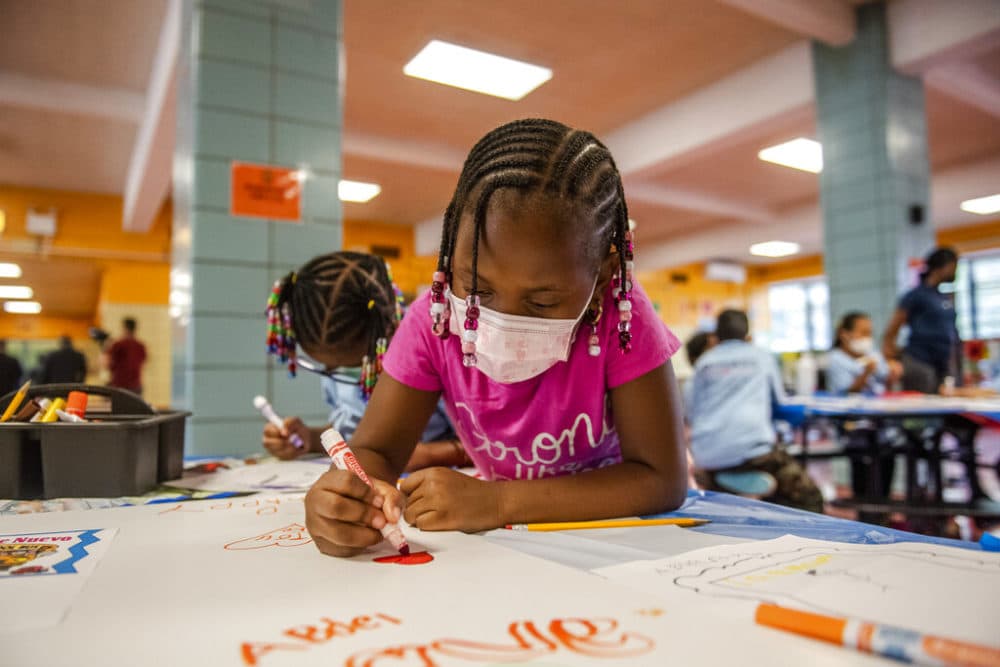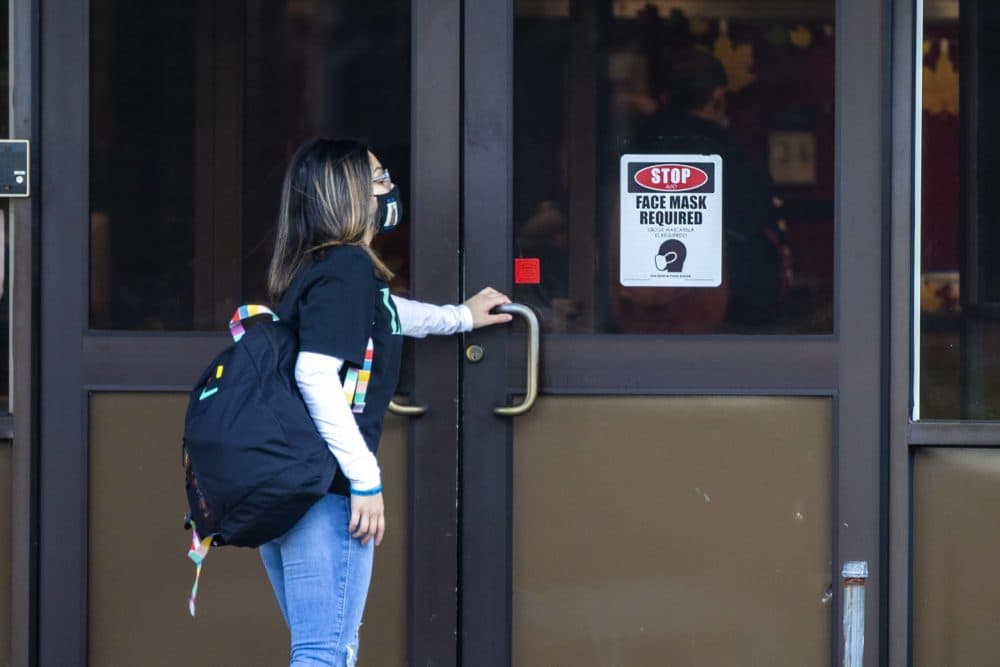Advertisement
Commentary
Why Massachusetts Schools Need A Mask Mandate

The past year and a half has been hard on Massachusetts students. Seemingly overnight, they went from attending school daily to a new reality of interacting with peers and teachers through their computer screens. As the COVID-19 pandemic snowballed outside their doors, they settled down and logged in. Once it was safe enough to return to school buildings, they stood three feet apart, doused their hands in sanitizer and masked up.
Why? Because we — the adults in their lives — told them that these sacrifices would help keep everyone safe. We told them that thinking about the greater good mattered. And we witnessed the incredible compassion and perseverance that our students showed, month after month, despite these challenges.
So what has changed? Why, as we prepare for another school year in the midst of a pandemic that has killed over 600,000 Americans, have so many of the adults in our children’s lives suddenly decided that the greater good no longer matters?
As Massachusetts Teachers of the Year, we are dismayed by Gov. Charlie Baker’s refusal to institute a PK-12 mask mandate in our state’s schools. By ceding this decision to individual districts, Gov. Baker has opened up a debate where none should exist, recklessly putting our youngest students, their families and their communities at risk.
As Massachusetts Teachers of the Year, we are dismayed by Gov. Charlie Baker’s refusal to institute a PK-12 mask mandate in our state’s schools.
Unfortunately, even though we are all ready for the pandemic to be over, it isn’t. On April 30, there were 1,190 new COVID cases reported in Massachusetts. At that time, we were operating under a mask mandate in our state’s schools, because we knew it was one simple way to keep more people safe. On Aug. 17, Massachusetts recorded 1,254 new confirmed cases since the previous report, but no mask mandate. As schools open across the country, we hear daily reports of hundreds of students sent home to quarantine, pediatric cases on the rise in local hospitals, and teachers, staff and families sick or dying from this virus. We have the opportunity to learn from other states' failures to mandate masks in schools.
Bucking the CDC’s most recent guidance, Gov. Baker cites Massachusetts’ high vaccination rates as evidence that a universal mask mandate is unnecessary here. But focusing on vaccination rates ignores the fact that we have a 0% vaccination rate among Massachusetts students under the age of 12. It also disregards the new CDC report that vaccinated individuals can contract and transmit the delta variant.
Advertisement

Hiding within the statistics is a stark reality: Most of the young people we are welcoming back into schools in a few short weeks are not vaccinated against COVID-19. As all students return to school full-time, they will spend hours inside full classrooms together with limited ability to practice social distancing. Mandating that all students and staff wear masks is a simple way to protect our kids.
Some people will argue that young children are not at high risk when it comes to this disease. But we aren’t only concerned about physical harm to our students; we also worry about the effects of trauma wrought by living through a life-altering pandemic. As the delta variant continues to spread, with higher transmission rates in children, exposure to the virus will lead to loss of learning time in school and the potential to transmit illness to others. Some of our students are particularly vulnerable due to medical conditions, and they, too, deserve to be safe in school. As teachers, we can confidently report that losing even one student is too many.
Magical thinking won’t make the pandemic go away.
One of the hardest truths to accept as adults is that we cannot protect children from every bad thing. Sometimes they will get hurt or feel sad or scared or lonely. Sometimes they will fall down or fail. But it is undeniably our responsibility to do our very best to protect them from avoidable tragedy. Issuing a statewide mask mandate for all of our PK-12 students and staff should not be a contentious or political decision. It is a moral decision, one that clearly communicates to our young people that taking action for the greater good, even if it feels inconvenient, still matters.
Magical thinking won’t make the pandemic go away. What will? Vaccinations for everyone who is eligible, and, in the meantime, continuing to use mitigation strategies like social distancing and wearing masks. We want to welcome kids back to school, and we want to do it safely. If wearing masks prevents any of our young people from becoming seriously ill, then it will have been worth the minor inconvenience. We urge Governor Baker to act with courage, institute a mask mandate, and end local debates about whether or not we should keep students safe.
Sydney Chaffee is the 2017 Massachusetts Teacher of the Year and the 2017 National Teacher of the Year. Audrey Jackson is the 2016 Massachusetts Teacher of the Year. Cara Pekarcik is the 2018 Massachusetts Teacher of the Year. Jamil Siddiqui is the 2019 Massachusetts Teacher of the Year. Takeru Nagayoshi is the 2020 Massachusetts Teacher of the Year.